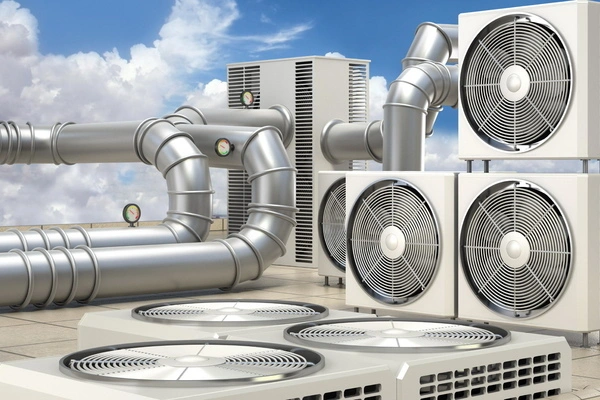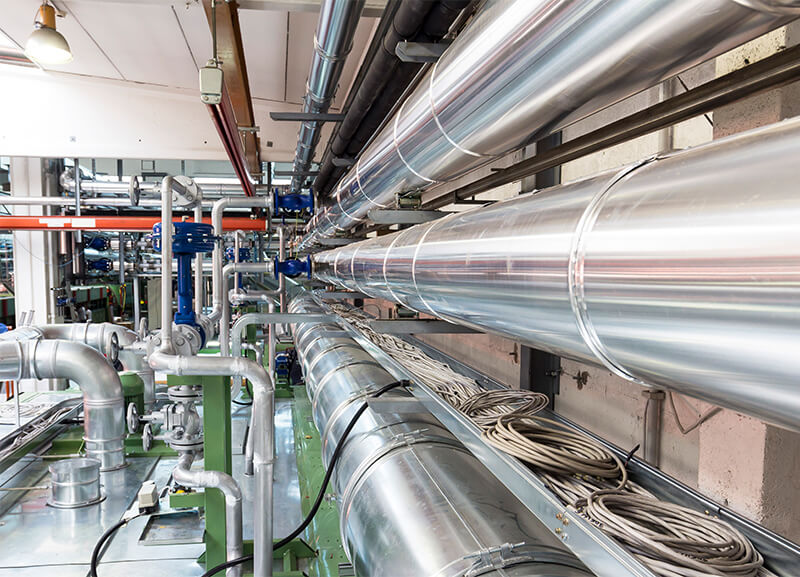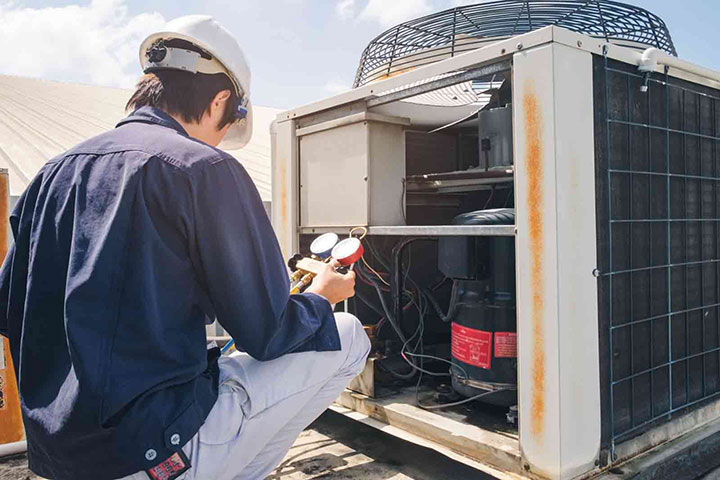How a Dependable HVAC System Enhances Indoor Air Quality and Comfort
A reliable cooling and heating system is necessary for keeping indoor air top quality and comfort. It controls temperature level and moisture, creating a much healthier living environment. Efficient air filtering eliminates toxins and allergens, while proper humidity levels prevent mold and mildew development. Routine upkeep warranties peak performance, improving system efficiency. Understanding these parts reveals exactly how they communicate to produce a fresh ambience. Nevertheless, the partnership in between a/c systems and total health goes much deeper than one could anticipate.
Comprehending the Fundamentals of A/c Equipments
Cooling and heating systems, essential for contemporary convenience, include home heating, air, and air flow conditioning elements that interact to regulate interior atmospheres. These systems are made to maintain optimal temperatures, guaranteeing that spaces continue to be comfy no matter of external weather problems. Home heating aspects, such as heaters or warmth pumps, supply warmth throughout cooler months, while air conditioning systems cool down spaces when temperatures climb.
Air flow plays a vital function, promoting the circulation of fresh air and removing stagnant air, which helps in keeping a well balanced ambience. Different types of cooling and heating systems exist, including streamlined and decentralized configurations, each fit for various structure dimensions and objectives. In addition, contemporary innovations have actually introduced smart modern technologies, enabling for boosted control over interior environment. Comprehending these fundamentals enables customers to appreciate just how a/c systems add to overall wellness and convenience in residential and industrial rooms alike, preparing for discussions on their effect on indoor air quality.
The Function of Air Filtering in Indoor Air High Quality
A significant element of preserving interior air top quality is reliable air purification, which plays a vital function in getting rid of pollutants and irritants from the environment. A/c systems outfitted with premium filters can record a series of impurities, consisting of dust, plant pollen, pet dog dander, and mold and mildew spores. This filtering procedure substantially decreases the concentration of air-borne particles, bring about a cleaner and much healthier interior environment.
Regular upkeep of air filters is crucial to ensure peak performance. Clogged or dirty filters can prevent air flow, reducing the system's efficiency and potentially allowing toxins to circulate within the room. By changing or cleansing filters as suggested, house owners can enhance their a/c system's capability to offer fresh air.
Humidity Control and Its Effect on Comfort
While several may concentrate on temperature guideline, moisture control is equally crucial for keeping convenience in interior environments. High moisture levels can result in pain, making rooms really feel warmer than they in fact are, while low humidity can trigger dryness, irritability, and raised susceptibility to breathing issues. A trusted HVAC system plays a substantial function in managing indoor humidity, guaranteeing that air is neither also wet neither also dry.
Optimal moisture levels typically vary from 30% to 50%, promoting a comfortable environment. When humidity is well-regulated, owners experience improved thermal comfort, enhanced interior air quality, and reduced dangers of mold and mildew development and dirt mite spreading. Correct moisture control can protect furnishings and structural components from damage created by extreme wetness or dryness. Integrating reliable moisture management into Cooling and heating systems is necessary for promoting a pleasant and healthy and balanced indoor environment conducive to well-being and performance.
The Relevance of Normal Maintenance
Routine upkeep of heating and cooling systems is important for guaranteeing peak efficiency and durability. This proactive method not only lessens possible malfunctions but additionally enhances power effectiveness, which can lead to significant cost savings over time. Scheduled assessments allow service technicians to identify and address concerns before they rise right into expensive repair services, ensuring the system runs efficiently.
Additionally, regular upkeep entails cleaning or replacing filters, inspecting cooling agent levels, and evaluating ducts, all of which contribute to perfect airflow and system performance. By keeping the cooling and heating system, homeowners can additionally avoid extreme wear and tear on parts, extending the overall life-span of the unit.
Moreover, a properly maintained cooling and heating system operates quietly and safely, reducing the danger of unsafe situations. To conclude, routine maintenance is an essential financial investment in both the performance of a/c systems and the comfort of indoor atmospheres, inevitably promoting a healthier home.

How Heating And Cooling Solution Reduce Allergens and Pollutants
Effective heating and cooling systems play a necessary function in lowering irritants and toxins within interior atmospheres, thereby improving overall air high quality. These systems utilize sophisticated filtration technologies that catch dust, plant pollen, mold and mildew spores, and pet dander, preventing them from distributing throughout the living space. High-efficiency particulate air (HEPA) filters are particularly efficient, trapping approximately 99.97% of particles as small as 0.3 microns.

Power Performance and Its Benefits for Health and wellness
Energy-efficient cooling and heating systems not only reduce power consumption but likewise have substantial health benefits for owners. By maximizing energy use, these systems can maintain consistent indoor temperatures, which aids protect against the development of mold and mold. Controlling moisture levels is crucial for breathing wellness, as excess moisture can intensify allergies and bronchial asthma. In addition, energy-efficient systems frequently include advanced filtering modern technologies that enhance air top quality by getting rid of air-borne bits and contaminants, better improving total health.
Furthermore, reduced energy consumption suggests decreased emissions from nuclear power plant, adding to cleaner exterior air top quality, which indirectly supports the wellness of residents. With a concentrate on sustainability, energy-efficient heating and cooling systems promote a healthier living environment. By buying such systems, property owners not just save money on utility expenses however likewise make a substantial dedication to the health of their families and communities. Inevitably, energy effectiveness in cooling and heating systems cultivates a healthier indoor environment for all.
Enhancing Convenience Through Smart Modern Technology Combination
As wise innovation proceeds to evolve, its assimilation right into HVAC systems considerably boosts indoor comfort. Smart thermostats, as an example, permit individuals to personalize home heating and cooling down routines based upon their day-to-day routines, ensuring excellent temperature levels when individuals are home. These gadgets can discover choices gradually, changing settings automatically for maximum comfort.
In addition, smart sensing units keep an eye on indoor air quality and moisture levels, offering real-time feedback that assists preserve a healthy setting. By communicating with heating and cooling units, these sensing units can motivate adjustments to air movement and temperature, ensuring consistent comfort.
Mobile applications additional encourage users, making it possible for remote control of a/c setups from anywhere, thus giving benefit and flexibility.
Frequently Asked Inquiries

Exactly How Can I Inform if My A/c System Is Effective?
To figure out heating and cooling effectiveness, one can examine power expenses for anomalies, evaluate for uncommon noises, monitor temperature level uniformity, guarantee appropriate air flow, and timetable routine upkeep. These factors jointly indicate the system's functional performance and performance.
What Signs Suggest Poor Indoor Air Quality?
Indications of bad interior air top quality include persistent odors, excessive dust buildup, enhanced allergy signs and symptoms, noticeable mold and mildew growth, and varying humidity levels. These indicators usually suggest that ventilation or air filtration systems may be insufficient or malfunctioning.
Can a HVAC System Aid With Pet Dander?

How Usually Should I Replace My Air Filters?
Air filters need to typically be replaced every 1 to 3 months, depending upon usage and indoor air quality. HVAC experts. Regular substitute aids preserve effective air flow and lowers dirt, allergens, and other bits in the home atmosphere
What Are the Prices of Heating And Cooling System Installation?
The expenses of HVAC system installment typically vary from $3,000 to $7,000, depending upon aspects such as system type, home size, and regional labor prices. Extra attributes may increase overall costs substantially.
A trustworthy HVAC system is essential for keeping interior air high quality and convenience. HVAC systems, essential for modern-day convenience, include air, heating, and air flow conditioning elements that work together to control indoor environments. Reliable Cooling and heating systems play a crucial function in reducing irritants and pollutants within interior settings, therefore enhancing overall air check here high quality. An A/c system can considerably decrease family pet dander by making use of sophisticated filtration systems and normal upkeep (HVAC experts). The expenses of HVAC system setup usually vary from $3,000 to $7,000, depending on factors such as system type, home dimension, and neighborhood labor rates